An earthy sweetness hangs in the early morning air of the old Cornish town. It is a little before seven, and we make our way through car parks and back lanes to the town centre, where the doorways and windows of every shop and home are framed with flowers and foliage. Not just display windows, but delivery doors, coaching inn arches and back alley gateways; every entrance and exit is wearing its own spring garland. The perfume of bluebells blends with the coconut bouquet of gorse and the green scent of cut stems. The transformation began as the shops closed last night and it will all be gone by tomorrow. Today is special.

As the hour is struck by the town clock, a bass drum booms in the distance and the faraway strains of a brass band bounce off granite walls, echoes mixing together, wafting in and out of musical focus down the streets. All eyes are on the town’s Guildhall as the day’s proceedings begin with the Early Morning Dance.
I’m in Britain’s most southerly town, Helston, for its annual Flora Day, a celebration so old that nobody has the faintest idea when it started, although most will offer a vague ‘pre-Christian’ label for it. The roots of Flora Day run deep in Helston – it’s a day the whole town is involved in, an occasion almost everyone celebrates because, as any Helstonian will tell you, Flora Day is bigger and better than Christmas.
Families get together, émigrés return, friends catch up with one another and joining them, up to 30,000 tourists descend on the town of just 11,000 souls. Although an internationally famous occasion, it is the local importance of Flora Day that clears calendars in its honour with unusual urgency; Andrew George, the town’s former MP, famously didn’t cancel his regular participation to attend his 2015 general election count. Nationally, it raised eyebrows, but any Helstonian would nod their head and agree. You can’t miss Flora Day.
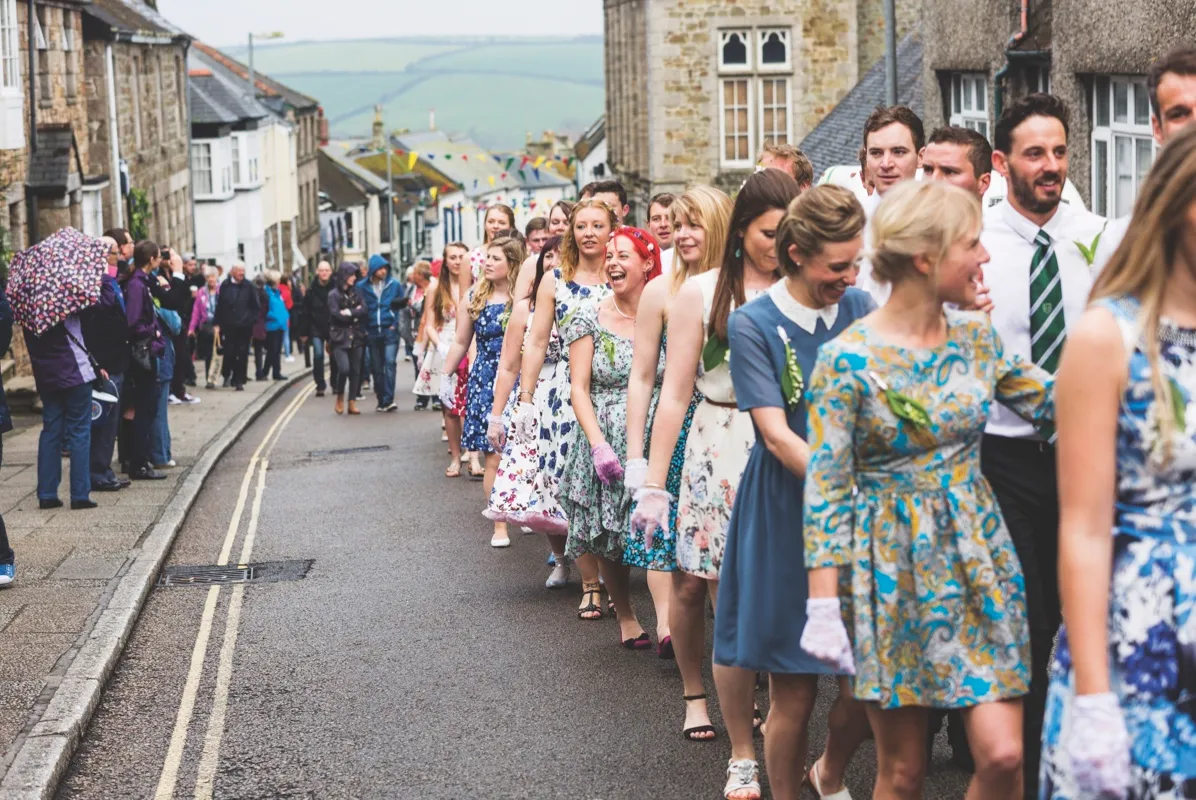
A Hop and a Scrape
A column of young couples dance up the street to turn at the top and dance back again. It’s a simple set of steps that are the same for each of the day’s four dances; the Early Morning at 7am, the Children’s Dance, the Midday Furry and the Evening ‘Five o’Clock’ Dance. Featuring a little hop and an offbeat scrape of the shoe, this delicate and courtly dance is maintained for three miles and drifts in and out of shops and homes all along the route. The Early Morning dancers repeat their performance in the Five o’Clock.

The Midday Furry is arguably the centrepiece of the day – it’s certainly when the most extravagant frocks are worn and Helston resembles nothing so much as a self-propelled guided garden party – but the Seven and Five (the Early Morning and Evening dances), as one participant put it to me, are “where you can dance in the company of friends and family – Helston people”.
A highlight is the Children’s Dance, which starts at 10am and is the largest of the day with about 1,200 youngsters aged between 7 and 18 taking part. All are dressed in white, the boys wearing their school ties, the girls in headdresses adorned with flowers in their school colours. It is so large, it takes two bands to provide the music, and 20 minutes to pass.

Orderly Queue
Back at the Early Morning, the ladies dance by in floral summer dresses, their gloved fingertips held gently by their partners, dressed in white shirt, striped tie and dark flannel. And the dress code is nothing compared to the social order that dictates exactly where and when you dance.
For dancers in the Midday – traditionally the province of the town’s gentry – the men are elevated to morning suits and top hats, while the ladies wear exquisite, floor-length floral ballgowns and Ascot-grade millinery. To dance in the Midday, you must be officially invited; and to be in the leading four of any of the dances, you must be Helston-born. For an internationally renowned event, it remains a very local affair.
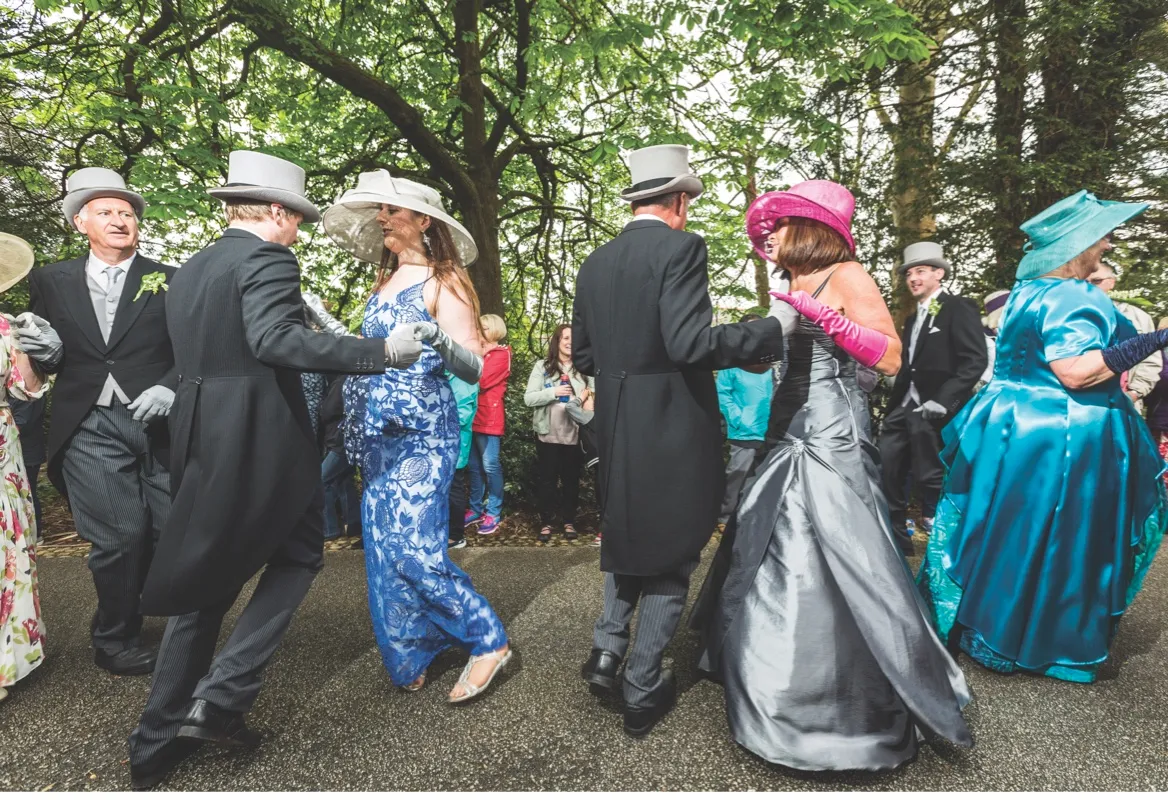
Spontaneous applause ripples down the street as dancers pass in the wake of the town band. For the band, these are the first steps of a 16-mile walk and of nearly 1,000 refrains of The Faddy, the rousing tune that accompanies the dances. They play, so the legend goes, music that has never been written down, to keep it unique.
Celebrating New Life
Part of the enduring appeal of Flora Day is that you end up in the same places as last year and see some of the same people. I’m not Cornish but I used to live here, in a flat above a fudge shop with fine views of the day’s events. Much of the day was spent on the streets, browsing at the market or in the Blue Anchor. An amazing brewery and pub, the Blue Anchor has been open since the 15th century, but also since 7am this morning, serving breakfast with beer – if you can handle it. Many try, and this inevitably takes its toll by the late afternoon, which underlines the original purpose of Flora Day – a celebration of new life that sprang from an era where lives were often brutish and short and any excuse for merriment was taken to wild extremes.

Over an hour later and the dancers are still going, half-way round the town at the foot of a steep slope in an area known as St John’s. A narrow road clings to the contours behind a granite wall and I watch as they bob down the slope, still managing to look refined, but we aren’t the only ones watching. A rabble regards them from the top of the hill, peering over the wall. As soon as the dancers pass, Helston’s less genteel tradition – the Hal-an-Tow – is announced in a cacophony of whistles, drums, horns and rowdy chants.
Wild Side of the Flora
The Hal-an-Tow is kind of historical pageant, spring ritual and mummers play rolled into one – and sprinkled with Cornish nationalism and some good-natured jibes at the English.The event has at its heart an old-fashioned tale of good versus evil.
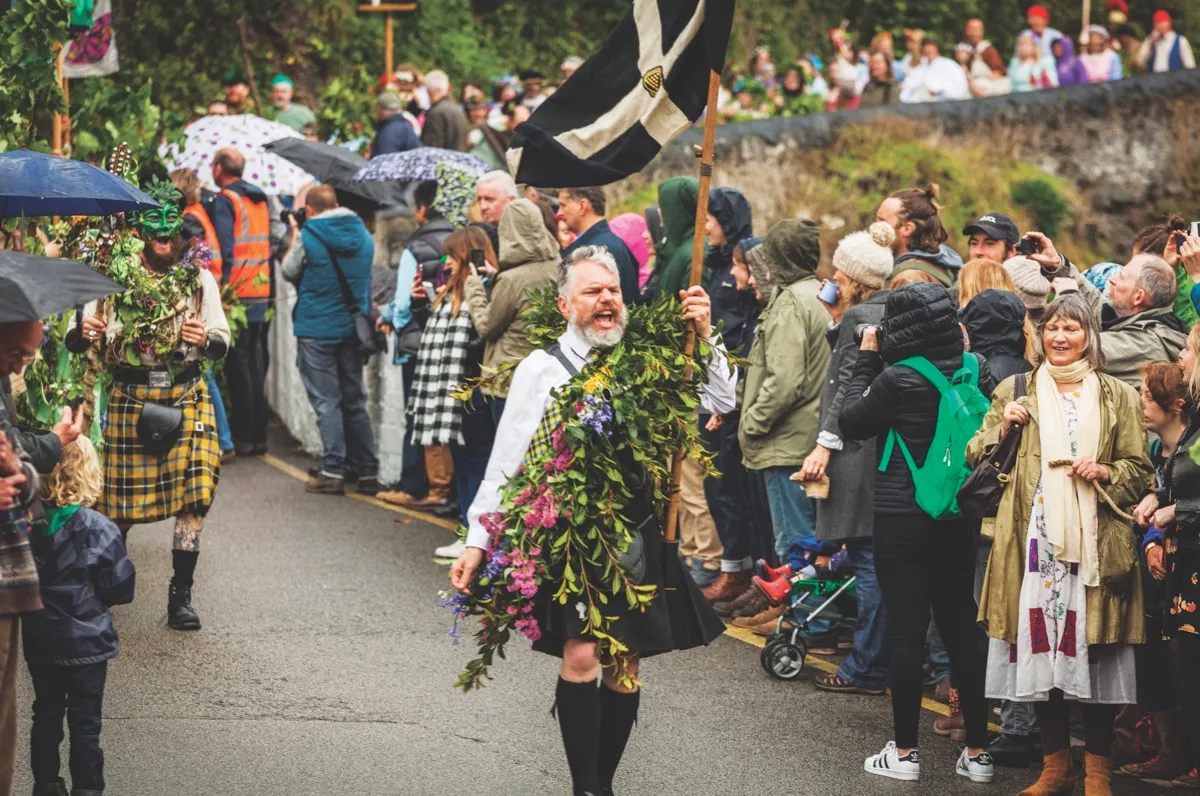
It features St George and the dragon, Robin Hood and Little John, St Michael (Helston and Cornwall’s patron saint) and the Devil, St Piran (Cornwall’s unofficial patron saint) on his millstone and, for good measure, marauding Spaniards from the Armada. It proved a little too rowdy for the delicate Victorians and was banned until 1930.
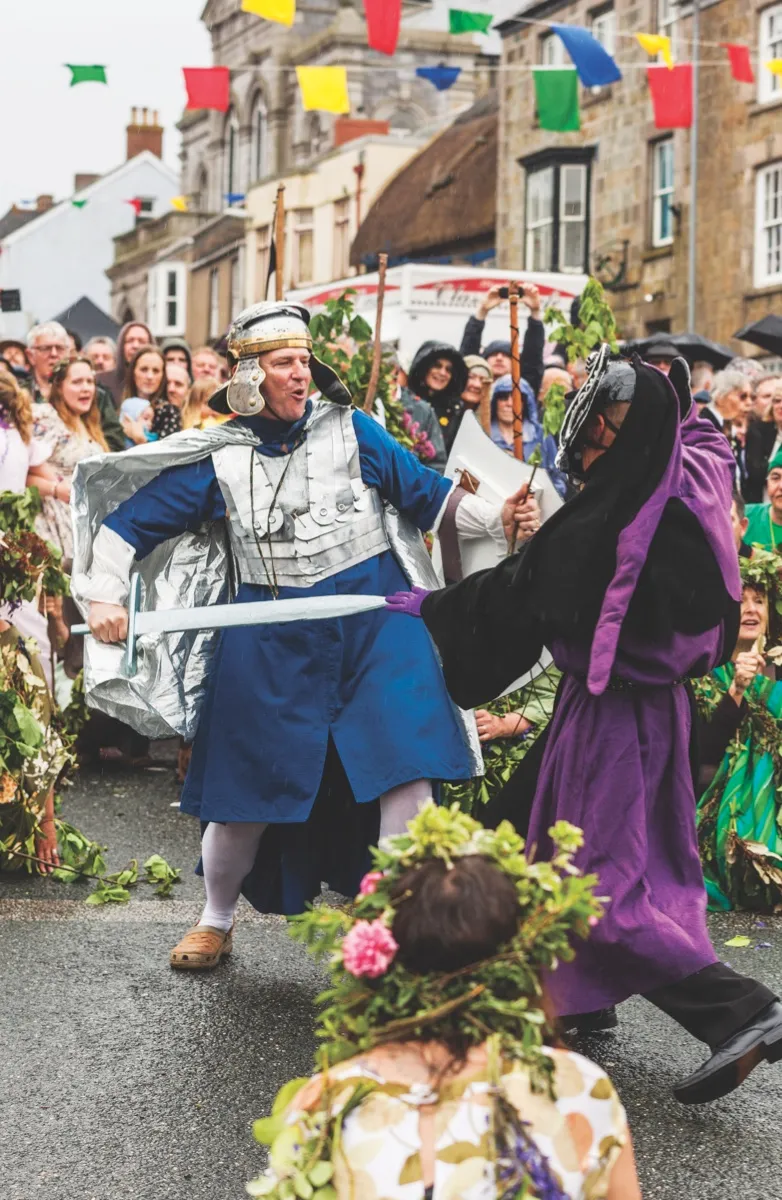
The day starts early for the Hal-an-Tow revellers. They harvest sycamore branches from the woods and on their return, join the cast of characters of the pageant to tour the town with rattles, drums, whistles and horns, garlanded with bits of tree and flowers and carrying Green Man banners. They arrive at their first performance for 8.30am and continue to tour the town, singing and acting at five venues.
The Hal-an-Tow is a raucous counterpoint to all the formality of the ‘official’ dance, but the whole day has the same pagan roots – and is as much fun and just as utterly confusing as the words of the Hal-an-Tow refrain.
Hal-an-Tow, Jolly rumble O
For we are up as soon as any day, O
And for to fetch the Summer home
The Summer and the May, O,
For Summer is a come, O,
And Winter is a gone, O.
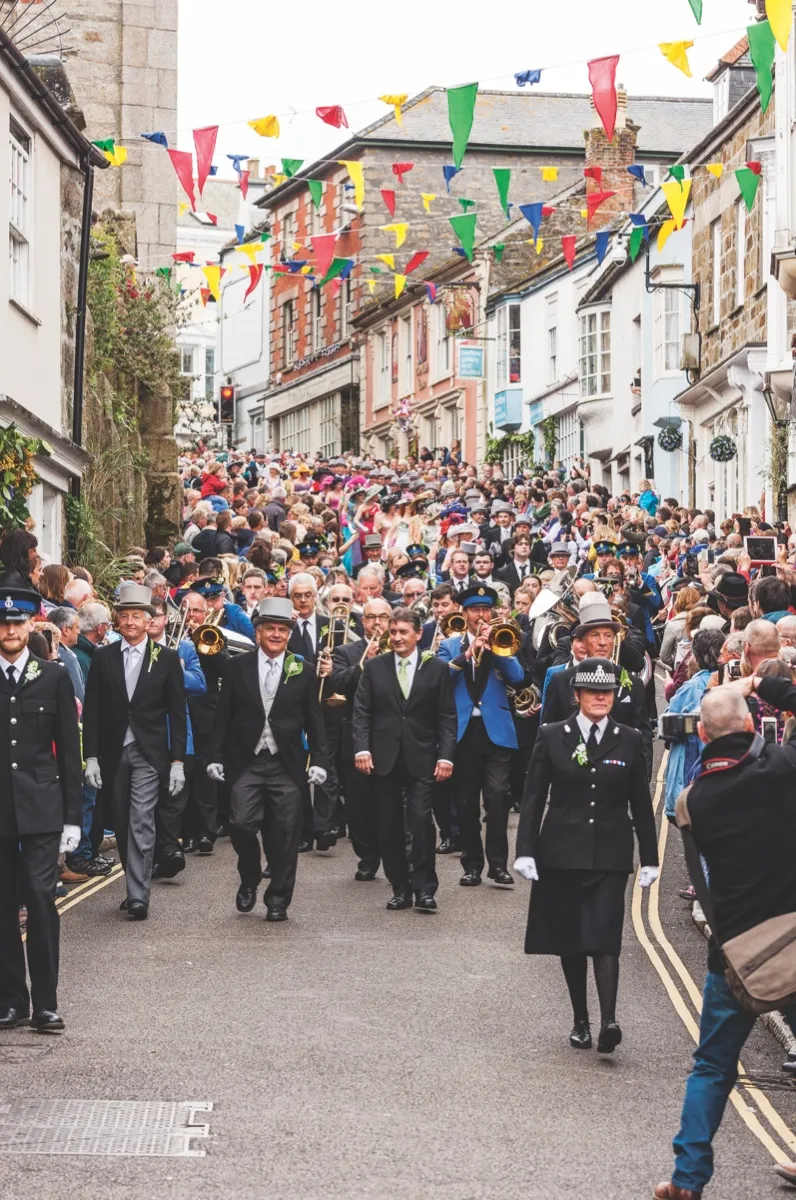
Helston’s Flora Day 2017 takes place on 6 May.
All Images © Mike Searle
